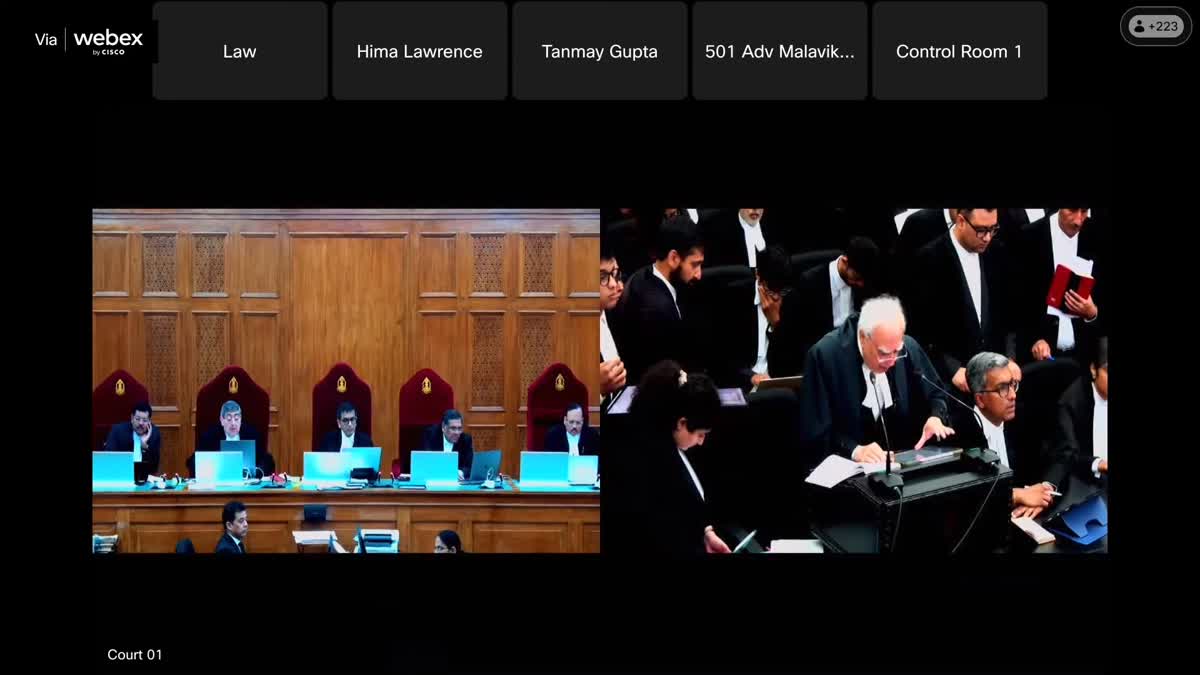New Delhi:A five-judge constitution bench headed by Chief Justice DY Chandrachud resumed hearing a batch of pleas challenging the Centre's Aug. 5, 2019 decision to abrogate Article 370, a move that had come in for vicious attack by some major opposition parties but earned fulsome praise from those supporting the BJP.
While the hearing has concluded for today, here is what transpired as senior Advocate Kapil Sibal put forth his arguments:
- Justice Sanjay Kishan Kaul lists two contentions. One is the submission that Article 370 has acquired a permanent feature of the Constitution. That's debatable by both sides. Number two. Suppose Article 370 doesn't have any permanency, is the due procedure followed in abrogating it?
- Senior Advocate Kapil Sibal representing petitioners against the abrogation says he will try and convince the Court that Article 370 is permanent. "You lordships say it is debatable. And it is debatable. There's no doubt in it". Justice Kaul interrupts and says it was debatable because both sides will argue. "Yes, it is really debatable," Sibal said. I will tell you why it is permanent, he added. Read More...
- Chief Justice of India D Y Chandrachud queries Sibal: "How can you say that the Parliament could not have exercised its plenary amending power to abrogate Article 370? Sibal says: "This is not basic structure (of the Constitution), this is a compact between one sovereign and another, which is drafted in our Constitution, unlike other states."
- The CJI asks Sibal, "Such a sovereign compact is not capable of being overridden?" Justice B R Gavai also questions Sibal, "Unless the view of the entire Jammu and Kashmir population is taken into consideration, abrogation of Article 370 cannot be done?"
- Sibal says "Yes" and adds that he understands that at some stage or another, this had to be done and stresses that but then it must follow the constitutional way to be doing it. He emphasizes that the governor of Jammu and Kashmir and the government were acting in tandem to get rid of Article 370 and it is a political (move). Sibal says it was a political process (Centre’s decision to abrogate Article 370), carried through constitutional means.
- Justice S K Kaul replies: "Everything is a political process Mr Sibal. The question is if it fits in the Constitution".
- Sibal said the governor in November 2018, dissolved the legislative assembly without the aid and advice of the council of ministers. Article 356, president’s rule, is for the restoration of democracy and it cannot be used for decimation of the democracy, he says.
- CJI asks Sibal: Can a ratification be done under 356? In relation to that particular state legislature? Sibal replies: "No, because he's exercising as state legislature. Ratification is of the state so there are two authorities - one parliament passing the law and then the state authority ratifying it. You can't take over both. It's like clapping by one hand. You can't even introduce the bill, forget about anything else! Here, by (Article) 356, you have done away with it.
- On the conversion of J&K into Union Territory, CJI Chandrachud says: So far J&K consent is needed and for other states only views are needed to introduce the bill. Justice Surya Kant: What was the procedure followed in passing the Constitution orders? Sibal: All passed with concurrence.
- Justice Kant: But what was the procedure? Was it through the parliament? Or by president? Sibal: It was through a presidential notification- after taking the consent- concurrence or consultation. That's how it's made applicable.
- Sibal: The views of the people were to be taken. Sibal: When all states were getting integrated into the Union, they didn't need consent. But since J&K was not integrated... Sibal: So you lose the link between the centre and the state altogether. You absorb the powers of the state with yourself as the executive, as well as the parliament and the legislature. And you decide without reference to any other institution.
- Sibal: So you give yourself consent. The people who gave themselves this constitution are left out of the process. This is essentially a breakdown of the constitutional structure.
- The hearing for the day concludes. It will resume on August 8.
